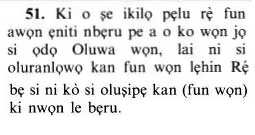6vs51
Select any filter and click on Go! to see results
وَأَنذِرْ بِهِ الَّذِينَ يَخَافُونَ أَن يُحْشَرُواْ إِلَى رَبِّهِمْ لَيْسَ لَهُم مِّن دُونِهِ وَلِيٌّ وَلاَ شَفِيعٌ لَّعَلَّهُمْ يَتَّقُونَ
Waanthir bihi allatheena yakhafoona an yuhsharoo ila rabbihim laysa lahum min doonihi waliyyun wala shafeeAAun laAAallahum yattaqoona
Index Terms
Click to play
Yoruba Translation

Hausa Translation
Kuma ka yi gargaɗi da shi ga waɗanda suke jin tsõron a tãra su zuwa ga Ubangijinsu, ba su da wani masõyi baicinSa, kuma babu mai cħto, tsammãninsu, sunã yin taƙawa.
Asbabu n-Nuzuul (Occasions of Revelation)
Allah's statement,
وَأَنذِرْ بِهِ الَّذِينَ يَخَافُونَ أَن يُحْشَرُواْ إِلَى رَبِّهِمْ لَيْسَ لَهُم مِّن دُونِهِ وَلِيٌّ وَلاَ شَفِيعٌ ...
And warn therewith those who fear that they will be gathered before their Lord, when there will be neither a protector nor an intercessor for them besides Him,
means, warn with this Qur'an, O Muhammad,
الَّذِينَ هُم مِّنْ خَشْيةِ رَبِّهِمْ مُّشْفِقُونَ
Those who live in awe for fear of their Lord, (23:57)
who,
يَخْشَوْنَ رَبَّهُموَيَخَافُونَ سُوءَ الحِسَابِ
Fear their Lord, and dread the terrible reckoning. (13:21)
وَأَنذِرْ بِهِ الَّذِينَ يَخَافُونَ أَن يُحْشَرُواْ إِلَى رَبِّهِمْ (those who fear that they will be gathered before their Lord), on the Day of Resurrection, لَيْسَ لَهُم مِّن دُونِهِ وَلِيٌّ وَلاَ شَفِيعٌ (when there will be neither a protector nor an intercessor for them besides Him), for on that Day, they will have no relative or intercessor who can prevent His torment if He decides to punish them with it, لَّعَلَّهُمْ يَتَّقُونَ (so that they may have Taqwa).
Therefore, warn of the Day when there will be no judge except Allah,
... لَّعَلَّهُمْ يَتَّقُونَ ﴿٥١﴾
so that they may have Taqwa.
and thus work good deeds in this life, so that their good deeds may save them on the Day of Resurrection from Allah's torment, and so that He will grant them multiple rewards.
وقوله " وأنذر به الذين يخافون أن يحشروا إلى ربهم ليس لهم من دونه ولي ولا شفيع " أي وأنذر بهذا القرآن يا محمد " الذين هم من خشية ربهم مشفقون الذين يخشون ربهم ويخافون سوء الحساب " " الذين يخافون أن يحشروا إلى ربهم " أي يوم القيامة " ليس لهم " أي يومئذ " من دونه ولي ولا شفيع " أي لا قريب لهم ولا شفيع فيهم من عذابه إن أراده بهم " لعلهم يتقون " أي أنذر هذا اليوم الذي لا حاكم فيه إلا الله عز وجل " لعلهم يتقون " فيعملون في هذه الدار عملا ينجيهم الله به يوم القيامة من عذابه ويضاعف لهم به الجزيل من ثوابه .
"وأنذر" خوف "به" أي القرآن "الذين يخافون أن يحشروا إلى ربهم ليس لهم من دونه" أي غيره "ولي" ينصرهم "ولا شفيع" يشفع لهم وجملة النفي حال من ضمير يحشروا وهي محل الخوف والمراد بهم المؤمنون العاصون "لعلهم يتقون" الله بإقلاعهم عما هم فيه وعمل الطاعات
أي بالقرآن . والإنذار الإعلام وقد تقدم في البقرة وقيل : " به " أي بالله . وقيل : باليوم الآخر .
I'raab - grammatical analysis of the Qur'an
«وَأَنْذِرْ بِهِ الَّذِينَ» أنذر فعل أمر تعلق به الجار والمجرور واسم الموصول في محل نصب مفعول به.
«يَخافُونَ» الجملة صلة.
«أَنْ يُحْشَرُوا إِلى رَبِّهِمْ» فعل مضارع مبني للمجهول تعلق به الجار والمجرور ، والواو نائب فاعله. والمصدر المؤول من أن والفعل في محل نصب مفعول به.
«لَيْسَ» ماض ناقص.
«لَهُمْ» متعلقان بمحذوف خبر الفعل الناقص ليس.
«مِنْ دُونِهِ» متعلقان باسم ليس المؤخر «وَلِيٌّ».
«وَلا» الواو حرف عطف لا نافية.
«شَفِيعٌ» عطف على «وَلِيٌّ» وجملة الفعل الناقص في محل نصب حال.
«لَعَلَّهُمْ يَتَّقُونَ» لعل واسمها وجملة يتقون في محل رفع خبرها ، وجملة لعلهم يتقون تعليلية.
